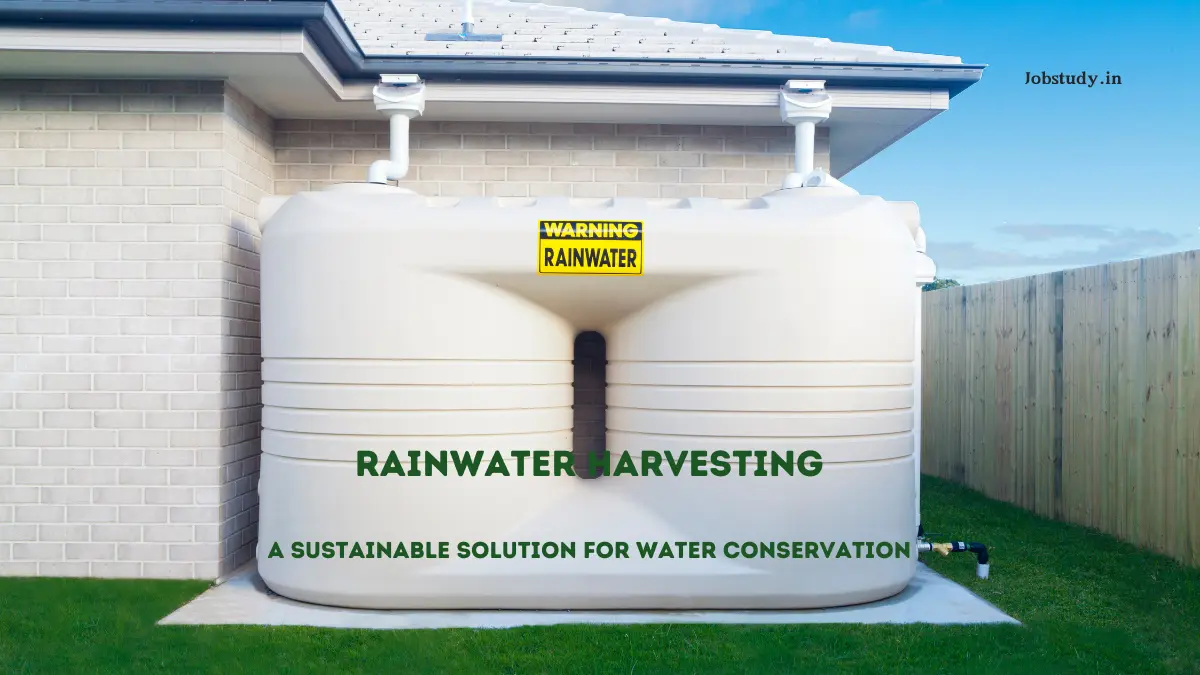Welcome to the world of rainwater harvesting, a practice that goes beyond conserving water—it’s a commitment to sustainability and environmental responsibility. In this comprehensive guide, we will delve into the intricacies of rainwater harvesting, exploring its definition, advantages, benefits, applications, and challenges. Join us on this journey to understand the profound impact this eco-friendly approach can have on our communities and the planet. In an era where sustainable practices are becoming increasingly vital, rainwater harvesting emerges as a beacon of hope for water conservation. This article delves into the intricacies of rainwater harvesting, examining its diverse applications, and addressing potential challenges associated with its implementation.
What is Rainwater Harvesting?
Harnessing Nature’s Gift
Rainwater harvesting is the process of collecting and storing rainwater for later use. It involves the use of various techniques and systems to capture precipitation from rooftops, surfaces, and other areas, channeling it into storage tanks or reservoirs.
Sustainable Water Collection, Eco-Friendly Rainwater Harvesting
Rainwater harvesting systems can be simple, like rain barrels connected to downspouts, or more complex, incorporating advanced filtration and distribution systems. The primary goal is to maximize the utilization of natural rainfall, reducing dependence on traditional water sources.
Advantages of Rainwater Harvesting
Environmental Impact
Rainwater harvesting significantly reduces the strain on conventional water supplies. By capturing and utilizing rainwater, we decrease the demand for treated water, ultimately conserving precious resources and promoting sustainability.
Cost-Effectiveness
Embracing rainwater harvesting can lead to substantial cost savings over time. Reduced reliance on municipal water sources translates to lower water bills, making it an economically viable and environmentally responsible choice.
Benefits of Rainwater Harvesting
Sustainable Landscaping
One of the key benefits of rainwater harvesting is its positive impact on landscaping. Rainwater, free from chemicals commonly found in tap water, nurtures plants and gardens more effectively, fostering healthier and vibrant green spaces.
Emergency Water Supply
In regions prone to droughts or water shortages, rainwater harvesting provides a reliable emergency water supply. Stored rainwater becomes a valuable resource during times of scarcity, ensuring communities have access to a crucial lifeline.
Application of Rainwater Harvesting
Residential Integration
The integration of rainwater harvesting into residential properties is a growing trend. Homeowners are installing systems that capture rainwater for various uses, from watering gardens to flushing toilets, contributing to both water conservation and household sustainability.
Read Also :- What are Weeds? How Can We Control Them?
Commercial and Industrial Adoption
Businesses and industries are also recognizing the benefits of rainwater harvesting. Implementing large-scale systems can lead to significant water savings, aligning with corporate social responsibility and environmental sustainability goals.
Challenges in Rainwater Harvesting
Regulatory Hurdles
In some regions, regulatory challenges may hinder the widespread adoption of rainwater harvesting. Understanding local laws and advocating for supportive policies is crucial for overcoming these obstacles.
System Maintenance
Ensuring the proper maintenance of rainwater harvesting systems is vital for their effectiveness. Regular checks, cleaning, and repairs are essential to prevent issues and optimize performance.
The Importance of Rainwater Harvesting: A Natural Resource Revolution
Rainwater harvesting represents a natural resource revolution, offering a sustainable solution to the growing water scarcity crisis. By harnessing the power of precipitation, communities can reduce their dependence on traditional water sources, ensuring a more resilient and eco-friendly water supply.
Benefits of Rainwater Harvesting: Nourishing the Earth and Your Wallet
The advantages of rainwater harvesting extend beyond environmental benefits. This practice not only nourishes the Earth by preserving water resources but also provides financial savings for individuals and communities. With reduced reliance on municipal water supplies, households can witness a noticeable decrease in water bills.
How to Implement Rainwater Harvesting Systems: From Sky to Storage
Implementing rainwater harvesting systems involves capturing and storing rainwater for later use. This can be achieved through the installation of gutters, downspouts, and storage tanks. Proper filtration systems ensure the collected rainwater is suitable for various purposes, from watering gardens to flushing toilets.
Types of Rainwater Harvesting Systems: Choosing the Right Fit
Rainwater harvesting systems come in various forms, including rooftop collection, surface runoff harvesting, and subsurface harvesting. Each type caters to specific needs and geographical considerations. Choosing the right system depends on factors such as climate, available space, and intended use.
Rainwater Harvesting for Agriculture: Cultivating Sustainability
Agriculture, a sector heavily reliant on water, stands to benefit significantly from rainwater harvesting. By integrating these systems into farming practices, agricultural communities can achieve water sustainability, reduce irrigation costs, and mitigate the impact of droughts.
Challenges and Solutions: Navigating Obstacles
While rainwater harvesting presents numerous advantages, challenges such as water quality concerns and initial setup costs must be addressed. Advanced filtration systems and financial incentives can overcome these hurdles, ensuring the long-term success of rainwater harvesting initiatives.
Success Stories: Real-world Impact
Across the globe, communities are experiencing positive transformations through successful rainwater harvesting projects. These success stories highlight the tangible impact of embracing sustainable water practices, inspiring others to follow suit.
Government Initiatives: Fostering Change
Governments worldwide are recognizing the importance of rainwater harvesting in achieving water sustainability goals. Supportive policies, financial incentives, and awareness campaigns are fostering change, encouraging both individuals and industries to adopt these eco-friendly practices.
Environmental Impact: A Greener Tomorrow
Beyond personal and financial benefits, rainwater harvesting contributes to a greener tomorrow by reducing the strain on traditional water sources. As communities adopt these practices, ecosystems flourish, and the overall environmental impact is significantly positive.
DIY Rainwater Harvesting: Empowering Individuals
Empowering individuals to implement rainwater harvesting on a smaller scale, do-it-yourself (DIY) systems offer a cost-effective approach. From simple rain barrels to innovative DIY setups, individuals can actively contribute to water conservation efforts.
Maintenance Tips: Keeping the Flow
Ensuring the longevity and efficiency of rainwater harvesting systems require regular maintenance. From cleaning gutters to checking filtration systems, following these maintenance tips guarantees a continuous and reliable water supply.
Rainwater Harvesting and Urban Planning: Integrating Nature in Cities
In urban planning, integrating rainwater harvesting systems presents an opportunity to blend nature with cityscapes. Green rooftops, permeable pavements, and communal rainwater harvesting initiatives contribute to sustainable urban development.
Educational Outreach: Spreading Awareness
Educational initiatives play a crucial role in promoting the adoption of rainwater harvesting. Schools, community centers, and online platforms can serve as hubs for spreading awareness about the benefits and implementation of these eco-friendly practices.
Future Trends: Innovations on the Horizon
The future of rainwater harvesting holds exciting possibilities with ongoing innovations. From smart rainwater harvesting systems to integration with renewable energy sources, the evolving landscape promises even more efficient and sustainable water solutions.
Case Studies: Showcasing Effectiveness
Examining real-world case studies provides valuable insights into the effectiveness of rainwater harvesting. From residential neighborhoods to industrial complexes, these examples demonstrate the versatility and positive impact of adopting such sustainable practices.
Frequently Asked Questions: Clearing Common Doubts
Is rainwater safe for consumption?
Rainwater is generally safe for consumption after proper filtration. Advanced filtration systems ensure the removal of contaminants, making it suitable for drinking and cooking.
What is the initial cost of setting up a rainwater harvesting system?
The initial cost varies based on the type and size of the system. However, long-term savings on water bills often outweigh the initial investment.
Can rainwater harvesting be implemented in urban areas?
Yes, rainwater harvesting can be effectively implemented in urban areas through innovative solutions like green rooftops and communal harvesting projects.
Do rainwater harvesting systems require a lot of maintenance?
Regular maintenance is essential for optimal system performance. Cleaning gutters, checking filters, and inspecting storage tanks contribute to longevity.
What government incentives exist for rainwater harvesting?
Many governments offer financial incentives, tax breaks, or subsidies to encourage individuals and businesses to adopt rainwater harvesting systems.
Can rainwater harvesting contribute to flood prevention?
Yes, rainwater harvesting helps mitigate flooding by reducing surface runoff and allowing rainwater to be stored or absorbed into the ground.
Conclusion: Wrapping Up the Raindrop Symphony
In conclusion, Rainwater harvesting is more than a conservation method; it’s a commitment to a sustainable and eco-friendly future. Embracing this practice empowers individuals, communities, and businesses to make a positive impact on the environment while enjoying economic benefits. As we navigate the challenges and celebrate the successes of rainwater harvesting, we pave the way for a greener, more resilient planet. Rainwater harvesting emerges as a harmonious symphony of environmental sustainability and practicality. As communities, individuals, and governments join hands to implement these solutions, we pave the way for a water-secure and ecologically balanced future.





